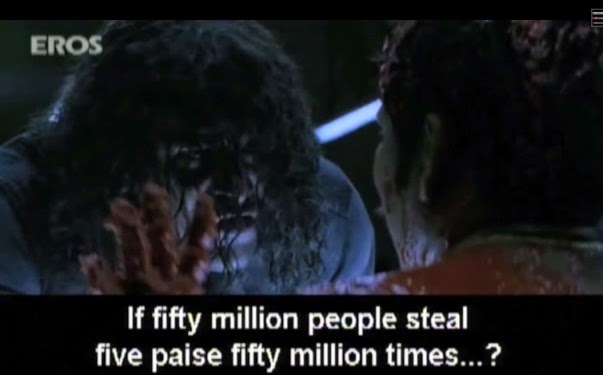Is
it the act of crime or the value of such crime, which should be focal point ?
The ‘Anniyan’ dialogue is certainly one to ponder – the general reaction to ‘5
paisa thirudina thappa’ – is that the amount is negligible but when ‘5 kodi per
5 thadava 5 paisa thirudina’ ? Here is what the Apex Court of the Nation had
to say in a Civil Appeal between an individual and Life Insurance Corporation
of India decreed in Jan 2015.
The case
pertains to the appeal against judgment
and order dated
27.8.2009, passed by the High Court of Judicature at Allahabad,
whereby said Court
has partly allowed
the appeal, and substituted the
punishment of removal
awarded to the
appellant, by compulsory
retirement from service.
The facts of the case, in brief, are
that the appellant was a cashier
with LIC working in an Office in
UP. A Policy holder deposited an amount
of Rs.533/- towards half yearly insurance premium in Aug 1990 - the same was not deposited in LIC till Nov 1990,
though a receipt was issued on 13.8.90 by the appellant. It appears
that when the LIC agent did not get his commission for this particular
payment, the amount of Rs.533/- was shown deposited by the appellant with late
fee of Rs.15.90/-, and entry was made in the cash register on 28.11.1990.
Also, a forged entry was made in ledger sheet
on back date.
In
connection with the above misconduct, a charge sheet was served on the employee
in Apr 1991 on the counts of temporary
embezzlement of Rs.533/- for a short period and forging entry of Rs.533/- in the carbon copy
of the
ledger sheet dated 13.8.1990 between entry Nos. 12 and 13. On
conclusion of the departmental enquiry, the appellant was
found guilty, and served with copy of enquiry report, whereafter he was
removed from service in Jan 1992. The
departmental appeal too was dismissed. Challenging
the order of removal from service
and that of
the appellate authority, the
appellant filed writ petition before the
High Court in Sept 1999. Aggrieved by
order of the learned Single Judge, Special Appeal was filed before Division Bench
of the High Court, by LIC.
The Division Bench, after hearing the
parties, came to the conclusion that the appellant appears
to have committed the forgery to cover his mistake, and partly allowed the
appeal by substituting punishment of
compulsory retirement in place of removal from service. The
appellant-employee has challenged the order of the Division Bench
of the
High Court by way of SLP mainly
on the ground that the
punishment of compulsory retirement is disproportionate, unreasonable
and harsh.
Attention of the Court was drawn to Rule
23 of Life Insurance
Corporation of India
(Employees) Pension Rules, 1995,
which reads as under:-
"23. Forfeiture of service.
- Resignation or
dismissal or removal
or termination or compulsory retirement of an employee from the service
of theCorporation shall
entail forfeiture of
his entire past
service andconsequently shall
not qualify for pensionary benefits."
- it was argued on behalf of the appellant that it being a case of temporary
embezzlement of a small amount, as such awarding minor punishment of stoppage of increment etc.
would have met the ends of justice.
It was also sought to be
portrayed that the amount could not be credited as the cash paid by policy
holder was short !
It did not
hold water and Court held that they did not find the punishment to be harsh or disproportionate
to the guilt, in view
of the nature of the charge of
which the appellant is found guilty. The Court opined that time and again the Court
has consistently held that in such matters no sympathy should be shown by the
Courts. Reference was drawn to - Divisional
Controller, N.E.K.R.T.C v. M. Amaresh,
where the Court held that :
" In
the instant case, the misappropriation of the funds by the
delinquent employee was only Rs 360.95. This Court has considered
the punishment that may be awarded to the delinquent
employees who misappropriated the funds
of the Corporation and the factors to be considered. This Court in a
catena of judgments held that the loss
of confidence is the primary factor
and not the amount of money
misappropriated and that the
sympathy or generosity cannot be a factor which is
impermissible in law.”
When
an employee is found guilty of pilferage
or of misappropriating the
Corporation's funds, there is nothing wrong in the Corporation
losing confidence or faith in such
an employee and awarding punishment of dismissal. In such cases, there
is no place for generosity or
misplaced sympathy on the
part of the
judicial forums and interfering therefore
with the quantum
of punishment........".
In another
case of KSRTC, the unaccounted money was only Rs.93/- - there too, the Court
held that " Coming to the question
of quantum of punishment, one should bear
in mind the fact that it is not
the amount of money misappropriated that
becomes a primary factor for
awarding punishment; on the contrary, it is the
loss of confidence which is the
primary factor to be taken into consideration.” In another case of Rajasthan
State Road Transport Corporation, the Court opined that in cases
involving corruption there cannot be any other punishment
than dismissal.
The
Court held that any sympathy shown in such cases is totally uncalled for and opposed to public interest.
The amount misappropriated may be
small or large; it is the act of
misappropriation that is
relevant. In the instant case,
the Hon’ble Court held that they are not inclined to interfere with the
impugned order passed by the High
Court and accordingly dismissed the appeal, with no order to costs.
With regards
– S. Sampathkumar
17th
Feb 2015.

No comments:
Post a Comment